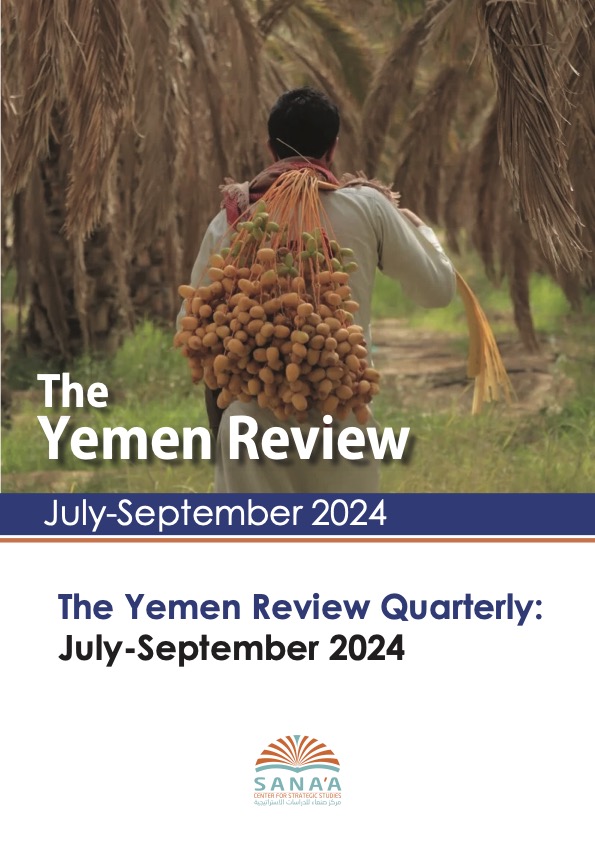Executive Summary
Houthis Attack Tel Aviv, Israelis Bomb Hudaydah
On July 19, a Houthi drone reached Tel Aviv, killing one person and wounding ten, the first time the Houthi group (Ansar Allah) has inflicted casualties in an attack against Israel. Israel responded the next day with airstrikes on the port of Hudaydah, destroying infrastructure and fuel stores and killing six workers. Dozens of others were hospitalized with severe burns. The Houthis unsuccessfully targeted Tel Aviv again on September 15, and Israel undertook further airstrikes on port and power facilities in Hudaydah governorate two weeks later, killing four and injuring 40. There is concern that the strikes will interrupt the flow of humanitarian aid through Hudaydah and that the loss of fuel reserves could lead to shortages in Houthi-held areas.
Red Sea Attacks Down as US Digs In
The Houthis targeted 12 commercial ships over the last three months, down from 21 the previous quarter. An attack on the Greek tanker Sounion stoked fears that an oil spill would foment an environmental disaster, but the stricken vessel was ultimately towed and salvaged with the assistance of the European Union’s Operation Aspides. US-UK strikes against Houthi drone and missile launch sites have continued, with CENTCOM claiming the destruction of 141 weapons systems over the last quarter. The US reportedly plans to spend US$1.2 billion on continued operations in the Red Sea.
Frontline Fighting Continues
Fighting between Houthi and pro-government forces continued across Yemen, though frontlines have remained largely static. The Karesh front between Taiz and Lahj has seen consistent action, along with central Al-Dhalea, southern Hudaydah, and Marib. Battles in Lahj and Marib saw Houthi forces capture several positions before Emirati-backed forces retook them. Fighting in Hudaydah halted in early September as flooding destroyed earthworks and weapons caches. Al-Qaeda detonated a car bomb at a Southern Transitional Council (STC) affiliated base in Abyan, killing 16 soldiers. The attack targeted forces engaged in the Operation Arrows of the East counterterrorism campaign on the second anniversary of its launch.
Crackdown on Revolution Day Celebrations
Houthi security forces arrested hundreds of people ahead of the anniversary of Yemen’s 1962 republican revolution, celebrated on September 26. The group views the commemoration of the event as a protest of the 2014 Houthi takeover in Sana’a, which the group marks on September 14. The suppression of the event has become increasingly severe in recent years.
Houthis Air More Forced Confessions
The Houthis have continued to broadcast forced confessions by former staff of the US embassy in Sana’a, accusing employees of spying for the CIA and participating in a far-reaching and decades-long plot to Americanize Yemeni culture. The forced confessions were first broadcast in June, and successive installments have been aired every month. The broadcasts accompany the ongoing arrest of Yemeni civil society activists and UN and aid workers, as the Houthis seek to expand their control over the humanitarian sector, even raiding the UN Office of the High Commissioner for Human Rights on August 13.
Cabinet Reshuffle, Judicial Interference in Sana’a
On August 10, Houthi authorities announced a reduced cabinet of 21 ministers headed by new Prime Minister Ahmed al-Rahawi. The new government preserves the appearance of power-sharing with the General People’s Congress party, but the appointments are strictly Houthi loyalists. The group also sought to extend its control over the judiciary, opening it up to political appointments and removing prerequisites for judges. The Yemeni Judges Club and Arab Lawyers Union condemned the new laws as an attempt to recreate the Islamic justice system that existed under the Imamate.
Kidnapping Undermines STC
The June kidnapping of Abdullah Ashaal al-Jaadani, a prominent commander in the pro-government Air Defense Battalion, led to a series of protests against the STC in Abyan and Aden. The group launched an internal investigation into the kidnapping but also cracked down on protests, killing two demonstrators. Local political actors have instrumentalized the outrage to challenge STC influence in the governorates.
Political Contestation in Hadramawt
Political machinations continued in the oil-rich eastern governorate of Hadramawt following the July 27 visit of Presidential Leadership Council (PLC) head Rashad al-Alimi. Rumors that Al-Alimi intended to restart oil exports and share revenues with Sana’a as part of a deal with the Houthis fueled ultimatums and protests by local tribal groups led by Deputy Governor Amr bin Habrish. Affiliated tribes set up checkpoints and interdicted fuel trucks, demanding improvements in public services and a greater share of oil revenues. The General Electricity Corporation accused the tribal alliance of exacerbating the very power outages it was purportedly protesting.
Flooding Causes Widespread Devastation
Heavy precipitation during the kharif rain season caused widespread devastation across the country, killing nearly a hundred people and affecting more than half a million. Thousands of people were displaced. Those already uprooted from their homes and living in temporary shelters and encampments were most affected. Rains and associated flooding also took a heavy toll on farmland, affecting some 30 percent of active agricultural areas. The World Health Organization warned that the flooding was exacerbating new outbreaks of cholera, with hundreds of new cases outstripping the capacity of medical centers and hospitals.
Riyadh Forces Central Bank Climbdown
A months-long effort by the Central Bank of Yemen in Aden (CBY-Aden) to bring the country’s financial system under its supervision ended in dramatic fashion when it was forced to back down on orders from Riyadh. Competition between the two branches of the divided central bank for economic control had led to tit-for-tat sanctions. But when the CBY-Aden cut off six Sana’a banks from the international SWIFT network, the Houthis threatened military retaliation against Saudi Arabia if the measures were not reversed. The episode has seriously undermined the CBY-Aden’s authority, and any plans to leverage financial access for concessions from the Houthis have been dashed.
Rial Hits Record Low
New rials, the banknotes used in territory controlled by the internationally recognized government, reached a record low in September, trading at less than YR1,900 to the dollar. The government has struggled to prop up its value through foreign currency auctions and various debt instruments, but the rial has now lost approximately a quarter of its value since the beginning of the year. Insufficient Saudi support and the ongoing Houthi blockade of oil exports are the primary drivers of decline.
WFP Resumes Food Distribution in Houthi-Held Areas
In August, the World Food Programme announced it would resume food assistance in Houthi-controlled territories after a six-month hiatus. The agency stated that 62 percent of households reported inadequate food consumption as of July. Details of distribution remain unclear as the humanitarian community struggles to deal with increasing Houthi restrictions and arrests. In September, the UN announced the suspension of all non-life saving and non-life sustaining activities in Houthi-controlled areas.
This issue of the Yemen Review was prepared by (in alphabetical order): Elham Babukair, Ryan Bailey, Raidan Bassah, William Clough, Casey Coombs, Yasmeen Al-Eryani, Tafweek Al-Ganad, Andrew Hammond, Khadiga Hashim, Abdulghani Al-Iryani, Yazeed Al-Jeddawy, Aylin Junga, Maged Al-Madhaji, Amal El-Mahdi, Solenn Al-Majali, Alexandra Nikopoulou, Ghaidaa Al-Rashidy, Salah Ali Salah, Miriam Saleh, Maysaa Shuja Al-Deen, Lara Uhlenhaut, Ned Whalley, and Wadhah Al-Awlaqi.
The Yemen Review is produced by the Sana’a Center for Strategic Studies. Launched in 2016, it aims to identify and assess current diplomatic, economic, political, military, security, humanitarian, and human rights developments related to Yemen.
In producing The Yemen Review, Sana’a Center staff throughout Yemen and around the world gather information, conduct research, and hold private meetings with local, regional, and international stakeholders in order to analyze domestic and international developments.
This series is designed to provide readers with contextualized insight into the country’s most important ongoing issues.

 اقرأ المحتوى باللغة العربية
اقرأ المحتوى باللغة العربية








